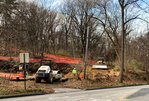The new SugarLoaf Campus entrance meant temporarily clearing the hillside at Germantown and Hillcrest Avenues. But it's been carefully planned, with new landscaping and stormwater measures on the way.
This item is available in full to subscribers.
We have recently launched a new and improved website. To continue reading, you will need to either log into your subscriber account, or purchase a new subscription.
If you are a digital subscriber with an active subscription, then you already have an account here. Just reset your password if you've not yet logged in to your account on this new site.
If you are a current print subscriber, you can set up a free website account by clicking here.
Otherwise, click here to view your options for subscribing.
Please log in to continue |






Chestnut Hillers who have not been following Chestnut Hill College’s construction plans have been startled by the suddenly naked appearance of the hillside at Germantown and Hillcrest Avenues, where a large stand of trees has been razed for construction of the new entrance to its SugarLoaf campus.
The clearing, which stretches about a city block south of where the new entrance will be, now reveals a steep hill of raw dirt and various large piles of wood chips.
Susan Mattioni-Hill, a resident of Roxborough, wrote to the Local to express her concern. “Seeing the extent of the deforestation and its potential environmental impact, especially being so close to Wissahickon and Germantown Pike, I am shocked,” she .
Another letter writer that in the short-term there is now a mountain of dirt and wood chips that could potentially create a mudslide if there were severe storms before the project is finished.
According to Christopher N. Spangler, Chief Communications Officer for Chestnut Hill College, the school is taking temporary measures to prevent erosion and sediment runoff during construction, in accordance with code.
As the work progresses, he said, the site is being graded and drainage continues to be installed. A Soil Erosion Control document provided by CHCS and Bohler Engineering, the landscape designer and engineer of record, shows a network of sediment and compost “traps,” silt curtains, fences, and a large erosion control mat throughout the east side of the SugarLoaf campus. The Philadelphia Water Department has conducted regular inspections.
“The temporary Erosion and Sediment measures are most effective under an expeditious construction schedule, and our contractors are working hard to keep the project moving forward safely and on schedule,” added Spangler.
Tree removal was completed on Dec. 7, he said. In addition to the trees that were slated for removal, another three close to Germantown Avenue were also taken down because they were dying and had dead limbs stretching toward the roadway. The college intends to replant the hillside with trees when construction is finished, he said.
Spangler, Chief Communications Officer for Chestnut Hill College, said the college is working with Bohler and had consulted the Morris Arboretum about the trees last year before work began. “The College has worked with the Arboretum in planning the project to this point, and we would happily accept their help in the future,” said Spangler.
Some trees were removed to accommodate the reconfiguration of foot and bicycle trails, Spangler said, adding that the plan has been to retain specimen trees while also accommodating requests from neighbors to move the trail farther back from Germantown Avenue.
The trailway will provide an easier connection from SugarLoaf to the Fairmount Park trail at the bottom of Germantown Ave. with better pedestrian and cycling safety.
Mark McGrath, the college’s Director of Facilities, has overseen the grounds at SugarLoaf for more than three decades. He said that the realignment of the trailway from Germantown Avenue allowed them to save several large desirable trees, including several oak, sycamore, tulip poplar, birch and beech trees. He also reports that under his supervision, the college has removed only trees in declining health or those that were damaged to the point of posing a life safety risk for trail users. These included ash trees (which are susceptible to the ), old and declining maples and oaks, box elders, and several smaller caliper saplings.
Terry Scott, director of marketing for the arboretum, said that organization has not yet been approached about help with landscaping once the main construction is finished.
Ultimately, the intersection will be widened, and left-hand turn lanes will be added on both Germantown and Hillcrest Avenues. For the next six months, Spangler added, traffic isn’t expected to be impacted. The college is still working with the city, he said, on planning the next phase of construction.
“All work will be done with the most minimal impact on traffic possible,” Spangler said, “but we do not yet have details.”
The construction and new landscaping is expected to be completed by the end of 2022.